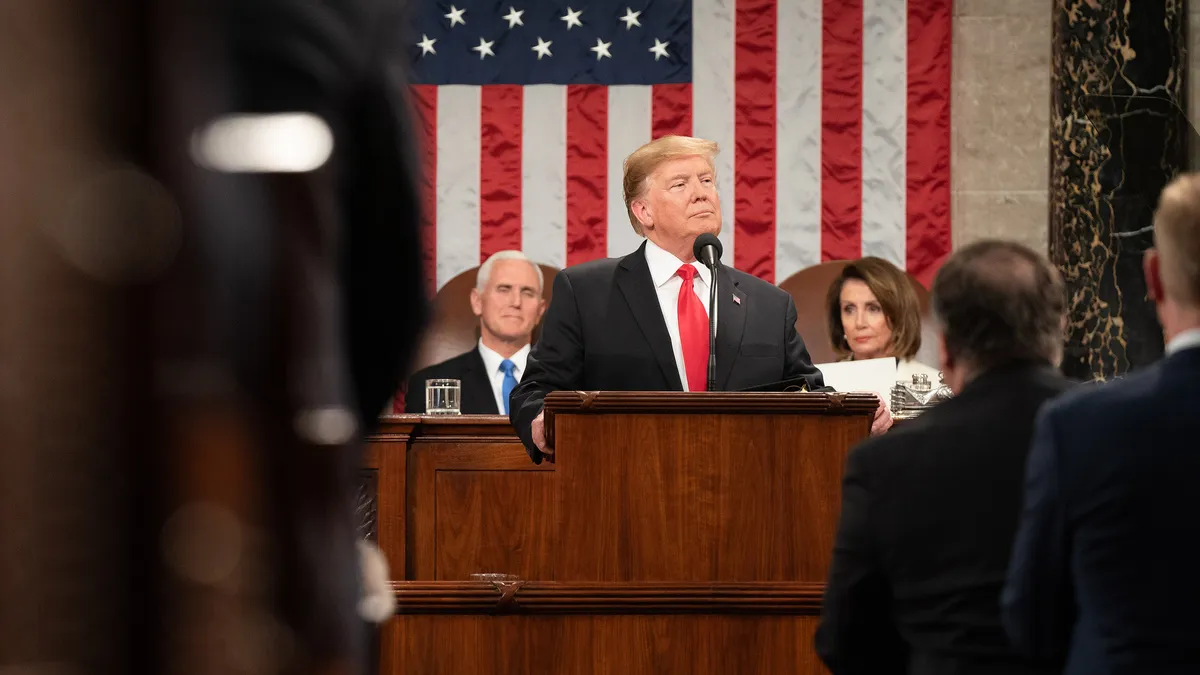Dive Brief:
- President Trump touted an "unprecedented economic boom" and hit each of the expected topics within trade policy and infrastructure development in his second State of the Union address Tuesday night.
- His comments on trade were short and direct, calling for passage of the United States-Mexico-Canada Agreement (USMCA) and the lesser-known Reciprocal Trade Act. He shared no concrete news on the ongoing trade negotiations with China but reinforced structural changes are at the heart of U.S. demands, along with reducing what Trump sees as a "chronic trade deficit" with the country.
- On infrastructure investment, the President said: "I know that the Congress is eager to pass an infrastructure bill — and I am eager to work with you on legislation to deliver new and important infrastructure investment, including investments in the cutting edge industries of the future."
Dive Insight:
President Trump gave no details on the state of negotiations with China. In fact, he did not mention the approaching March 1 deadline that could up the tariff on $200 billion in Chinese imports from 10% to 25%.
"We are now making it clear to China that after years of targeting our industries, and stealing our intellectual property, the theft of American jobs and wealth has come to an end," said Trump.
U.S. Trade Representative Robert Lighthizer and Treasury Secretary Steve Mnuchin will travel to China for another round of negotiations later this month, but Trump has made clear that he and Chinese President Xi Jinping will likely end up hammering out any final deals. Trump did not announce any plans to meet with Xi before the March 1 deadline.
The National Retail Federation (NRF) and other trade associations are leading a campaign of 100 business owners to Capitol Hill today to inform Congress about the negative effects of tariffs.
"Achieving structural reforms, ending existing tariffs and putting an end to the trade war would provide much-needed certainty and relief for American businesses and families. We encourage the administration to continue to focus on the end goal, and for Congress to restore rather than further neglect its role in trade policy," said NRF CEO Matthew Shay in response to the speech.
Trump's language on the USMCA was also a bit more muted than it has been in the past. "I hope you can pass the USMCA into law," he said, before calling for passage of the Reciprocal Trade Act. The relatively new bill would give Trump more unilateral power to add and increase tariffs. In the speech, he described the virtue of the bill as such: "if another country places an unfair tariff on an American product, we can charge them the exact same tariff on the same product that they sell to us."
But according to an assessment by the right-leaning think tank American Action Forum, the policy would raise prices for American consumers by $60 billion, without factoring in retaliatory tariffs. In a January statement, the NRF called the policy "misguided." U.S. Chamber of Commerce Chief Policy Officer Neil Bradley wrote in a letter to Congress that "the bill would undermine U.S. economic growth and job creation, elicit damaging retaliatory tariffs against U.S. exports, and cede Congressional power to the executive in a manner that raises constitutional concerns." And CNN reported Tuesday a bipartisan group of senators is currently working on legislation that would curtail Trump's tariff powers.
Though the White House spent much of 2018 attempting to steer the national conversation toward infrastructure with little success, the topic received just two sentences in the speech with no specific projects or appropriations mentions.
Trump's overall description of the country's economy was glowing, even as economists begin to debate a slowdown.
"The U.S. Economy is growing almost twice as fast today as when I took office, and we are considered far and away the hottest economy anywhere in the world. Not even close," said Trump.













